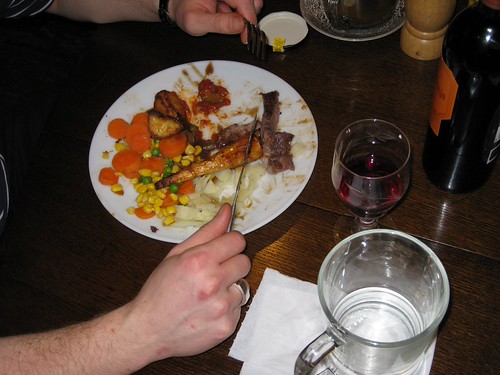At the end of the weekend away at Rob’s (Weakened away), Stew was unable to take my brother and I to the station and so Rob stepped into the breach.
We packed all of our stuff into the back of Rob’s car, waved goodbye to the house and set off to the local station. Soon after setting off, we could hear a strange scratching and scraping noise coming from under the car. Rob was worried, could it be his exhaust? We didn’t have much time before our train, so Rob decided to go for the pragmatic approach and hope for the best. We’d check it out once we got to the station. All the way there it continued to scrape. It was a strange transition, at first the noise was unwelcome – a sign that something had gone wrong. Once Rob had decided that he was going to hold on until the station the continued noise was a blessing – it meant that whatever it was hadn’t fallen off.
We pulled into the station and all three of us got out of the car. Immediately it was obvious what had caused the noise. Sticking out of the rear passenger door that none of us had used was a small branch of a sapling – something about half a metre long with about 10 twigs on it. We all had a good chuckle of relief; Rob opened the door and pulled the branch out. Then he started breaking the branch into bits and putting the twigs back onto his back seat. But as he was doing this, a young boy approached.
“Why have you got a branch attached to your car?”, he shouted.
We didn’t really know how to respond to the question. We hadn’t planned this thing, and yet that was clearly the only way that this kid could imagine something like this could have happened.
“Why have you got a branch attached to your car?”, he shouted again, although he didn’t need to shout as much this time as he was standing right near to us.
Rob is, I think you could say, somewhat of a hippy nature. And he decided to emphasise that style in his response.
Rob: “I think it just wanted to come for a ride, man.”
Rob had, as this was going on, almost finished putting the bits of branch into the back seat.
Boy: “Why are you putting a branch back in your car?”
Rob: “It just wants to go home man. I’m just going to take it home.”
Boy: “No. Seriously, WHY ARE YOU PUTTING A BRANCH IN YOUR CAR?”
The boy, it would seem, had a small number of rage issues. My brother judged the moment…
Pete: “Hey, stop giving us so much stick.”
We chuckled to ourselves about this joke. The kid was clearly not best pleased.
Boy: “Don’t you insult me mate. Don’t you insult me you pr!@k!”
Pete: “It was only a joke, mate.”
Boy: “Oh, you think it’s funny to insult an 11 year old kid, do you? Think you’re tough insulting an 11 year old kid?”
Pete: “No.”
Boy: “My dad’s a f*£king traveller and he’ll do you if he finds out that you’ve been messing around with his kid.”
Pete: “Right.”
Me: “I think we have a train to catch.”
Boy: “You better get on that train because my dad’s going to come down here in a moment and he’s a f*£king traveller and he’s going to get you.”
We all started to edge towards the station, except the kid who seemed to be edging towards wherever his dad was. Just as we were almost out of earshot, Pete again judged the moment correctly…
Pete: “I can’t believe you two didn’t stick up for me.”
We all started laughing again. We are quite easily amused. This, however, wasn’t wise as the kid, who presumably hadn’t heard what Pete had actually said (not that it would have mattered) thought we were laughing at him.
Kid: “Right, I’m getting my dad.”
We should have told him to leaf it out, or we’d call the copse.








